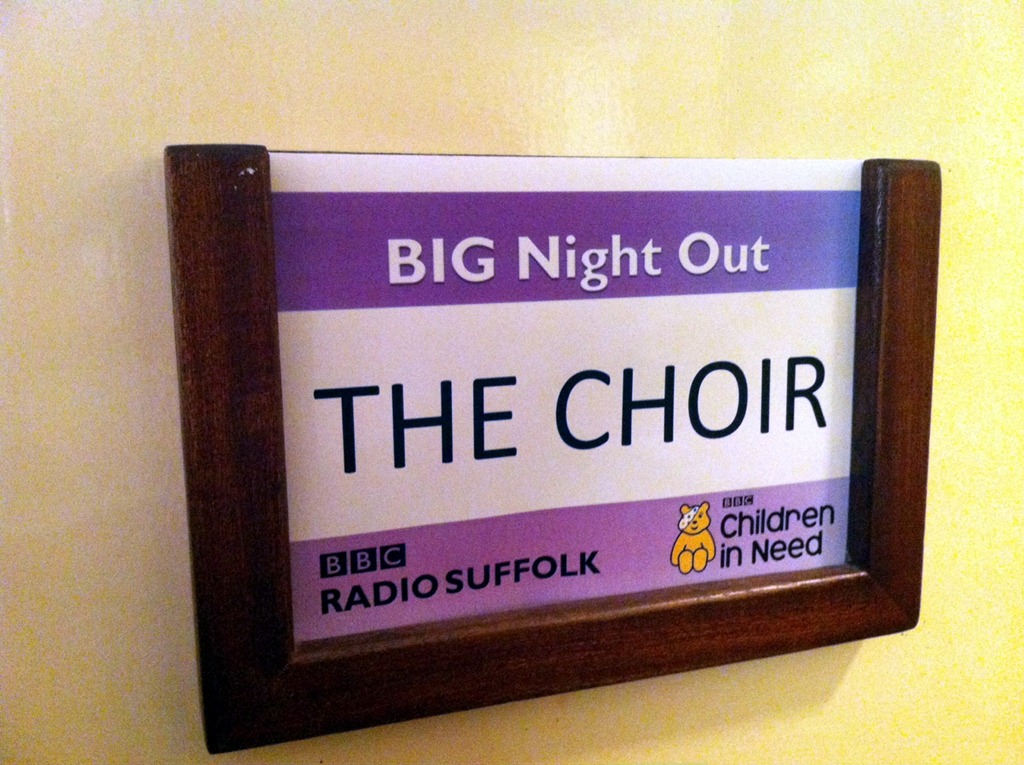[A version of this article first appeared as a post on my blog From the Front of the Choir]
A few years ago I was asked by BBC Radio Suffolk to create a choir from scratch to perform in a concert in aid of Children in Need: The Big Night Out Community Choir.

60 strangers gathered in a church hall and after just three hours we had a choir with three songs in four-part harmony (plus dance moves!) ready for public performance. How did we achieve that so quickly?
For me, it’s quite obvious that – with the right material – it’s possible to get any group of people singing in harmony very quickly. But the singers always seem surprised!
I get comments like:
“Being able to make 40 people who do not know each other sing so well together was amazing.”
“I always find it miraculous how much we achieve in such a short time.”
“Thanks for showing us that the impossible is ... possible!”
“It is hard to explain to people how one person can get an eclectic mix of people singing beautiful music in next to no time.”
In the spirit of last week’s post on self-awareness (The secret to great singing that teachers don’t tell you), I thought I’d better give some thought to how I manage to get great results in such a short time.
It never occurs to me that it won’t all come together in time. I behave as if everything is straightforward and easy and everyone just gets stuck in. I assume that all the singers will be able to cope with the songs I throw at them, and they do (see also How to get the best from your singers: don’t tell them it’s hard and Trust me – you know it makes sense).
A choir is all about team-work, but it’s not necessary to be good mates with the singer next to you or even to know their name (see Singing in the company of strangers). It’s a myth that you need to get on well with and really know your fellow singers.
In a scratch choir everyone is in the same boat and it actually helps that people don’t know each other. If you knew you were standing next to an experienced singer or a magistrate it might affect your confidence.
Stay calm and confident and that will reassure the singers and help them to trust you. Even if you’re worried that things are going pear-shaped, just behave as if everything is OK and it will be. Be authoritative and praise often. This will help nervous singers and prevent anxiety from creeping in.
One of the best techniques for getting the best out of a group is to use humour. Keep things light and fun all the time. If you need to correct or fine-tune then do it lightly. It’s only a choir, it’s not that important in the greater scheme of things. And if you’re having fun, it will rub off on everyone else.
Over time you will realise which songs work quickly and which don’t. Choose your songs carefully. You’ll need songs that are fairly easy and quick to learn, but which appear to be rich and complex. Even if the harmonies are fairly simple, you can come up with interesting ways to present the songs by bringing parts in at different times, adding stage movement, clapping, etc. Don’t choose songs which have lots of words or which have complicated structures.
The Children in Need choir that I made was given an extra rehearsal so we could practice in the venue we would be performing in. We didn’t actually need it, and it went rather badly.
My belief is that when all the material is new and the choir not yet formed, singers just go along with the flow and are pleasantly surprised by the results. But if you have more rehearsal then people’s brains kick in and they begin to doubt. So usually the second rehearsal is much worse than the first one, and you often don’t get any further.
I create a choir from scratch over six weekly two-hour sessions each year. We learn eight or nine songs in four-part harmony, some with dance moves. It’s such a full-on project that people don’t have time to think so the results are great. If we had much longer to rehearse, I think it would actually get worse! (see also Why too much rehearsal can be a bad thing)
You might say that the bunch of singers I whip into shape in such a short time can’t really be called a ‘choir’. Many of you know I have problems with that term (see Avoiding the ‘C’ word: choir). For me, any group of singers who can perform four-part unaccompanied harmony songs in public to a good standard is definitely a choir!
To summarise, these are the ingredients I think you need to be able to create a choir from nothing in a short time:
You might also want to check out The six qualities needed to he a good choral director.
Of course, it’s not all up to whoever is creating and leading the choir, the singers have responsibilities too! See How to be a good choir member and The bigger picture.
I’d love to hear from you if you’ve either set up or been in a choir that’s been created from scratch for a one-off event. Do drop by and leave a comment and tell us about your experience. Have I missed any important elements out? Was your choir a success? If so, why do you think that was?
Chris Rowbury
website: chrisrowbury.com
blog: blog.chrisrowbury.com
Facebook: Facebook.com/ChrisRowbury
Twitter: Twitter.com/ChrisRowbury
Monthly Music Roundup: Tinyletter.com/ChrisRowbury